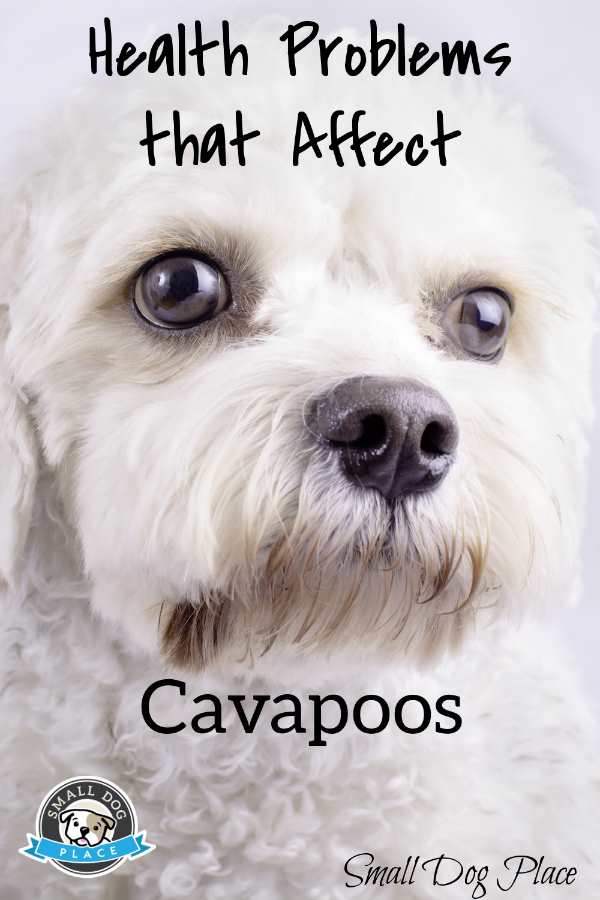- Small Dog Place Home
- Hybrids
- Health Problems That Affect Cavapoos
Health Problems That Affect Cavapoos
By Glenn Anderson |Published 12-14-2022
Cavapoos are an increasingly popular dog breed thanks to their intelligence and loyalty. They are also low shedding; thus, why they are considered hypoallergenic.
And it's no wonder they're one of the most in-demand breeds in America.
A Cavalier King Charles Spaniel and a Poodle are bred together to create the Cavapoo.

Cavapoo Behavior and Temperament
Cavapoos are one of the most popular designer dogs. This is because of their loving, sweet, and brilliant nature. They quickly adapt to new environments and respond fast to training.
Although the genetic combinations may result in varying personalities, all Cavapoo typically have a sweet disposition that makes them ideal companion dogs for families with kids.
However, like all dogs, there can be health issues associated with this breed. This article will explore Cavapoo temperament and common health problems you should be aware of when considering getting a Cavapoo or if you already have one.
Health Problems that Affect Cavapoos
Hip Dysplasia
Hip dysplasia is a common health problem in Cavapoos. This occurs when the ball-and-socket joint of a dog's hip becomes misaligned due to abnormal development. This is usually due to genetics or environmental factors such as nutrition, exercise habits, and even physical trauma.
If left untreated, it can cause pain and arthritis in your pet, limiting mobility and affecting the quality of life.
 Even though this is a relatively healthy dog breed, there are some health problems that affect Cavapoos.
Even though this is a relatively healthy dog breed, there are some health problems that affect Cavapoos.Symptoms of hip dysplasia include:
- Limping
- Difficulty standing up after lying down for prolonged periods
- Reluctance to move around or jump on furniture/stairs any more than necessary
- General stiffness while walking/running
Like any other inherited disease, an early diagnosis from regular vet check-ups is vital. However, routine examinations since puppyhood will help identify it early.
This ensures that treatment methods can begin immediately, especially for puppies over eight weeks old who may show signs sooner than older adults.
Hernia in Cavapoos
Inguinal hernia is another fairly common ailment among Cavapoos caused explicitly by genetic predisposition.
It can also be due to excessive straining during defecation/exercise activities which create pressure inside the abdomen, leading them to develop a bulge near their groin area.
Common symptoms include vomiting, lethargy, and possible urinary incontinence when the disease is advanced.
Treatment typically involves surgical repair, and most often, it requires follow-up surgeries depending on the size of the hernia. You are also advised to visit the vet regularly to ensure the condition is diagnosed before it gets worse.
Mitral Valve Disease in Cavapoos
Mitral valve disease is an inherited condition that affects the mitral valve located between the left atrium and ventricle of your Cavapoo's heart. This weakens your heart and can cause a leaky or blocked blood flow.
Symptoms include heart palpitations, dizziness, and breathing difficulties, accompanied by a bluish tint on the nose and tongue due to a lack of oxygen saturation found within the lungs.
You’ll notice that your Cavapoo has a tough time sleeping. The condition can be treated with medication and surgery if it's advanced.
Cataracts in Cavapoos
Cataracts are a more common Cavapoo health problem that affects them primarily due to age-related eye degeneration. However, some breed lines appear genetically predisposed to developing these sooner than later.
Cataracts appear like gray areas inside the lens, preventing normal transmission of light into the retina, causing blurred vision, loss of color contrast recognition, and eventually complete blindness if not caught early enough.
However, you can slow the disease progression using medication or laser treatments. Closely monitor your Cavapoo by taking it to the vet for a check-up every six months.
Epilepsy in Cavapoos
Epilepsy is another genetic disorder affecting many dog breeds, including Cavapoos, as it is genetically inherited from both parents.
However, most cases only manifest mild symptoms of seizures and require minimal intervention and medication control throughout their lifetime.
To prevent the occurrence, you must remove items that overstimulate your Cavapoo, such as bright lights and noises.
Luxating Patella in Cavapoos
A luxating patella is an ailment where the kneecap becomes dislocated due to an abnormally shaped groove it sits within. It's most common in small dogs such as Cavapoo because they have shallow knee sockets that facilitate excessive patella movement.
Luxating Patella can cause pain, lameness, and even discomfort while running and jumping. It also affects overall quality of life, but thankfully, most cases resolve themselves with rest over time, and regular vet visits track progress.
The condition can be controlled through an exercise program, which helps guide the kneecap back into place. Surgery may be recommended in severe cases.
Progressive Retinal Atrophy in Cavapoos
Progressive retinal atrophy (PRA) is yet another eye condition that results from the degeneration of photoreceptor cells found at the back of the eyes, leading to gradual vision loss until, eventually, complete blindness sets in later stages.
If you have a Cavapoo, regular check-ups are essential for early detection since treatments slow down progression significantly. Symptoms of PRA include dilated pupils, night vision difficulties, and inability to perceive color contrasts accurately.
Tips to Guarantee the Health of Your Cavapoo

To ensure your Cavapoo remains happy and healthy throughout its lifetime, do the following:
Buy from a Reputable Breeder
When buying your Cavapoo, it's essential to make sure that you get it from a reputable breeder. This ensures the puppy has been checked for potential health problems and given all necessary vaccinations before selling.
Avoid buying puppies on impulse, as this could mean getting an unhealthy pooch that may require costly medical attention or even euthanasia in extreme cases.
Pet Health Insurance
It's also worth looking into pet health insurance. These policies can help cover unexpected vet bills if your pup becomes ill or injured. Pet insurance helps minimize financial burdens in unfortunate circumstances, so always check out what different providers offer before committing.
Constant Check-up
Regular vet visits are essential for keeping track of your Cavapoo's overall general health and well-being. This is because many illnesses and conditions can be identified early on with the correct examinations. Remember to book those appointments and ensure you are up-to-date with the latest developments in their doggie healthcare sector.
Healthy Diet
Diet is key to maintaining good dental and overall health, especially among Cavapoos. They tend to have sensitive stomachs and allergies, which must be considered during meal times. Otherwise, you'll be dealing with diarrhea and vomiting. Talking to your vet about diet-related matters is more important than trying to figure it out yourself.
Health Problems that Affect Cavapoos: Final Thoughts
Cavapoos are a beautiful dog breed and can bring lots of joy into
people's lives, but like any breed, there are some common health issues that
you need to look out for.
Regular vet visits are essential for monitoring changes in behavior, limping, or other signs of pre-existing problems. This ensures you're well-prepared for the potential risks beforehand, making life much easier by treating the conditions promptly before they worsen.
Health Problems That Affect Cavapoos: Pin For Future Reference
Health Problems that Affect Cavapoos: Author Bio
Glenn Anderson has been a freelance writer for years. A pet enthusiast and a flag-bearer of organic eating, a fitness freak, and obsessed with all things food, plants, and animals. He also loves writing and discussing things that make him happy.
About Janice (author and voice behind this site)
Having lived with dogs and cats most of her life, Janice served as a veterinary technician for ten years in Maryland and twelve years as a Shih Tzu dog breeder in Ohio.
Her education includes undergraduate degrees in Psychology with a minor in biology, Early Childhood Education, and Nursing, and a master's in Mental Health Counseling.
She is a lifelong learner, a dog lover, and passionate about the welfare of animals. Her favorite breed for over 50 years has been the Shih Tzu, but she has also lived with Poodles, Maltese, Yorkshire Terriers, Beagles, English Bulldogs, Carin Terriers, and a Cocker Spaniel.
When not writing, reading, and researching dog-related topics, she likes to spend time with her eight Shih Tzu dogs, husband, and family, as well as knitting and crocheting. She is also the voice behind Miracle Shih Tzu and Smart-Knit-Crocheting
Does This Article Deserve Your Thumbs Up?
We always appreciate your support and encouragement. Your thumbs up means so much to us. Please like this article.
If you find this page or any page on Small Dog Place Helpful, or useful in anyway, I'd love it if you would click the small heart found on the bottom right of each page.
You can also share or bookmark this page -- just click on the:
Your second block of text...

Free Monthly Newsletter
Sign Up for Our Free Newsletter and get our Free Gift to You.
my E-book, The Top 10 Mistakes People Make When Choosing a Dog (and how to avoid them)


